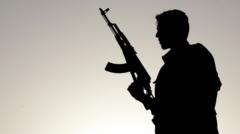The PKK's move to lay down its arms comes after years of turmoil, aiming for a transition to democratic means for addressing Kurdish rights in Turkey.
Kurdish PKK Takes Significant Step Toward Ending Armed Conflict with Turkey

Kurdish PKK Takes Significant Step Toward Ending Armed Conflict with Turkey
In a historic ceremony, the Kurdish PKK begins disarmament, signaling potential progress in resolving a decades-long conflict with Turkey.
In a defining moment for peace talks in Turkey, the Kurdistan Workers' Party (PKK), considered a terrorist organization by multiple nations including Turkey and the US, has publicly initiated a disarmament process after decades of conflict. The symbolic ceremony, attended by around 30 PKK fighters at the iconic Jasana cave in Iraq, saw members ceremonially burn their weapons, marking a potential turning point in a struggle that has claimed around 40,000 lives since its inception in 1984.
The Turkish government has welcomed the occasion, labeling it a "critical threshold" towards establishing a "terror-free Turkey." The disarmament process, which is expected to unfold throughout the summer, involves formal steps coordinated with Turkish and Iraqi authorities.
Historically, the PKK was established as a Marxist group that initially sought an independent Kurdish state within Turkey. However, its goals shifted, focusing instead on advocating for greater autonomy for Kurds, who represent about 20% of Turkey’s population. The recent initiative comes on the heels of remarks from Abdullah Ocalan, the PKK's imprisoned leader, who emphasized this as a voluntary transformation from armed conflict to democratic engagement.
Despite previous failed attempts at peace, including a ceasefire declared in 2013 that unraveled amid violence, Ocalan’s current directives signal a new phase for the group. He now advocates for disarmament and the exploration of democratic pathways to resolve longstanding Kurdish issues.
Events leading to the disarmament have been influenced by Turkish political dynamics, particularly the shifting stance of key political figures. Nationalist leader Devlet Bahceli has urged Ocalan’s release from solitary confinement, furthering the dialogue surrounding potential PKK dissolution. The Turkish government recently initiated talks with Ocalan, aiming to foster a favorable environment for peace discussions.
Ocalan’s historical significance remains pivotal; despite widespread resentment in Turkey, he continues to hold a symbolic position among many Kurds. Prior to the disarmament ceremony, Ocalan made a rare video appearance urging his followers to embrace peace over violence, reinforcing his role in the conflict's evolution.
The next steps in this process will see the Turkish parliament establish a commission to outline the future of the disarmament efforts, which could reshape not only PKK dynamics but also the Turkish political landscape. In parallel to ongoing reforms, speculation surrounds President Erdogan's potential constitutional changes aimed at securing his political future. With upcoming parliamentary votes, significant developments are expected, keeping a close eye on Ocalan’s status and the broader implications for Kurdish rights in Turkey.


















